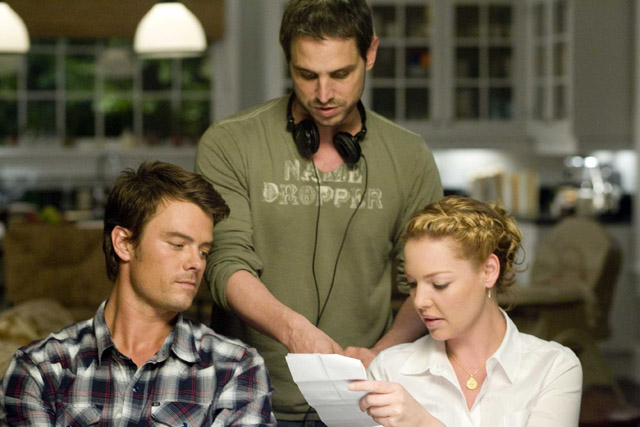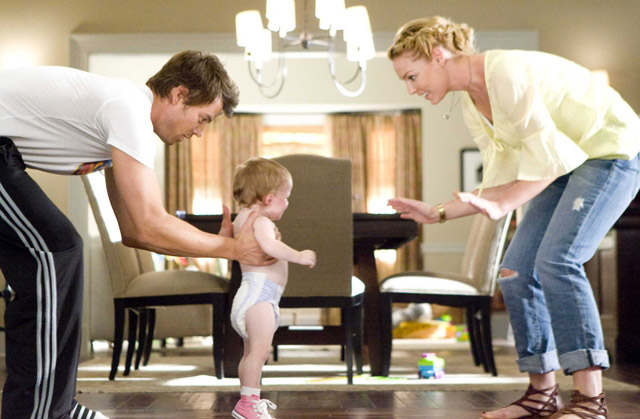CHICAGO – The Steppenwolf Theatre of Chicago continues to provide different viewpoints on the American stage, and their latest “Little Bear Ridge Road” is no exception. Featuring ensemble member Laurie Metcalf, it’s the resonate story of a family at the crossroads. For tickets/details, click LITTLE BEAR.
Interview: Director Greg Berlanti of Katherine Heigl’s ‘Life as We Know It’
CHICAGO – The romantic comedy gets another variation with the new release, “Life As We Know It,” with Katherine Heigl and Josh Duhamel playing opposites who need to attract when thrust into a childcare situation that they didn’t anticipate. The film is directed by Greg Berlanti, who is also the screenwriter to the upcoming “Green Lantern” movie.
Greg Berlanti made a splash in 2000 by writing and directing the cult favorite “The Broken Hearts Club: A Romantic Comedy,” catching much of the cast (Zach Braff, Timothy Olyphant, Nia Long and Jennifer Coolidge) right before their breakout popularity. He went from there to produce popular TV like “Dawson’s Creek,” “Everwood” and “Brothers & Sisters,” and premiered a new show in this fall’s season, “No Ordinary Family.”
In film, he is involved in both writing and producing the new “Green Lantern” film, slated for release in 2011, and is involved in preproduction for “The Flash.”
 Photo Credit: Peter Iovino for © Warner Bros. Pictures |
HollywoodChicago.com got the opportunity to talk with Greg Berlanti via phone, and discussed working with Katherine Heigl in his latest film, plus a career retrospective that includes the comic book hero movies.
HollywoodChicago.com: When you first saw the script of Life as We Know It, what emotion did you want to play from it, and how did you motivate the actors to achieve it?
Greg Berlanti: When I first read the script, by page 25 I found myself emotionally caught up in it, because of the unfortunate situation that happens with the parents. I also found myself recovering rather quickly, and laughing in spite of those tragic things, and in some ways laughing through the tragedy. I really wanted to achieve that for the movie, we all did. I think that’s part of what makes the film special.
In terms of motivating the actors we tried to always get variations, but also tried to get things as real and authentic as possible. If any of the jokes or the emotional parts felt too false to any of us, we kept going until it felt real. The reality of it was how we got to go from one extreme to another in a movie like this.
HC: You have many high level names on the executive producer list. Who was the prime motivator for doing the film, and did they get the ball rolling?
GB: Barry Josephson brought it to Paul Brooks, and the two of them are the main producers on the movie. They really got the ball rolling by sticking with it over six or seven years, even when studios were passing because the total mixture of emotions can be deadly, if you don’t get it right.
They believed in the story and script, and kept passing it around town until Katherine Heigl read it. Probably more than anybody, she was in a position to get the movie made, because of her previous success. She really wanted to make a movie like this and chose this film. Her name got everybody else to support it and get behind it financially.
HC: When you are dealing with ‘types’ when it comes to actors in the film, I’m thinking Katherine Heigl and her image and Christina Hendricks with her persona on Mad Men, are you cognizant that you need to let actors like this do something different to separate themselves from their perceived types to achieve the character? Was there an example that you want to note where you did that?
GB: When I read the script, Katie was already attached, and I was always a fan of hers from ‘Grey’s Anatomy,’ and really felt that on the show she got to show a range of emotions – not just comedy, and not just drama. In this film, I actually just wanted to capture what I thought her range was.
As far as Christina, I always loved her on Mad Men. She came in and read the part, and was instantly the role, no one ever doubted it. I think the best thing you can do as a director with casting is try and find the people who are the role and let them do their thing. You can modify it a little bit, give some notes as you go and you can help them with the tone of the scene, but the fact if the matter is if they are right for the role, they will do all the heavy lifting themselves.
HC: The film portrays a certain economic and social class, upper middle, that is prevalent in films. Is this a story that would have been different if the players were lower middle class or below? Is there a certain advantage to making characters upper middle class when portraying this type of narrative?
GB: I will answer this in two parts. We tried to address that in the script, the characters that we have, moving into that house, would never be able to afford this situation. The family who had passed away had left the money in the will. Our protagonists don’t have that kind of money, but it is fortunate that the mortgage is paid for, we wanted to address that with the audience.
Secondly, when you are doing a romantic comedy, which is still of a heightened nature, and you’re dealing with such a dark subject matters in places, I do think you want to offset that with other elements of things that make it still an inviting place to be. We knew we were dealing with death in a romantic comedy, but we still want some of the environment that these people are in to have a warmth to it.
HC: So I just interviewed Ryan Reynolds regarding the upcoming Green Lantern. As the screenwriter, what do you think the character of the Green Lantern has that other heroes don’t? And how does that contribute to his overall personality and presence as a super hero?
GB: It was interesting for us to figure out ways to dramatize Green Lantern. The thing that he has is willpower. That is the source of his strength and an important part for us, to figure out a way to dramatize the script. How do you express that force of will, how do you express that inner resolve, and do in a way that is satisfying for audiences? That was our challenge.
HC: The Broken Hearts Club is a legendary friendship movie and beautifully speaks of themes regarding fellow travelers and heart in the manifestation of living as a gay American. What inspired the screenplay and how were you able to get that incredible cast together to communicate so beautifully?
GB: The screenplay was quasi-fictional and semi-autobiographical. It’s a little bit based on my own experiences coming out and the experiences of my friends at that time, and not dissimilar to Life As We Know It, we had to make our own family.
In terms of the cast, our casting director was also a producer on the movie, and really wanted to make sure that even though it was a small film that we got a cast of up-and-comers that hopefully would go on to do great things, and lucky for them and lucky for us they did.
 Photo Credit: Peter Iovino for © Warner Bros. Pictures |
HC: Considering all the actors that went on to bigger things out of Broken Hearts Club, it seems like one of those centerpiece breakout films like ‘Fast Times at Ridgemont High’ and ‘The Big Chill.’ Since it continues to have considerable influence today, what in your view is the legacy of the film in culture and how would you like it to be remembered?
GB: I guess I’d like it to be remembered as a warm and intelligent snapshot of what it was like to be a gay man in Los Angeles in the mid-to-late 1990s. That was our hope then and hopefully people will look back on it that way, and people both gay and straight will continue to enjoy it.
HC: No Ordinary Family is getting a lot of positive buzz as it premieres. What do you want to highlight about the super hero life that is different on this show than a plain super hero movie?
GB: I think the joy of television is that you get to stretch things out a lot longer than you can in a film. Think about the first 45 minutes of a typical super hero movie when they get their powers and they have to melt into them into their usual life. That’s something on a show like this that we can do for a year or two years, and really stretch it out and have fun with those moments. That’s our hope, and we did really solid numbers for the premiere, so hopefully people will keep checking us out.
HC: Your career arc is rising right now and you seem to be extraordinarily busy. Is there a pet project do you hope to get into the atmosphere as you evolve with your life as producer, director and writer?
GB: Mostly I’m been focused on what’s happening now, and I would say that the gentleman I did the Green Lantern, we’re now off to write the script for The Flash. I hope that is received as well as the script for Green Lantern was.
HC: Will you get a shot at maybe directing The Flash?
GB: Right now I’m about the story and the script, making it as good as it can be. I try not to think beyond that, because there is too much on the plate at this moment.
HC: Will Kid Flash make an appearance?
GB: I can’t reveal anything like that, but you were smart to ask.
 | By PATRICK McDONALD |


